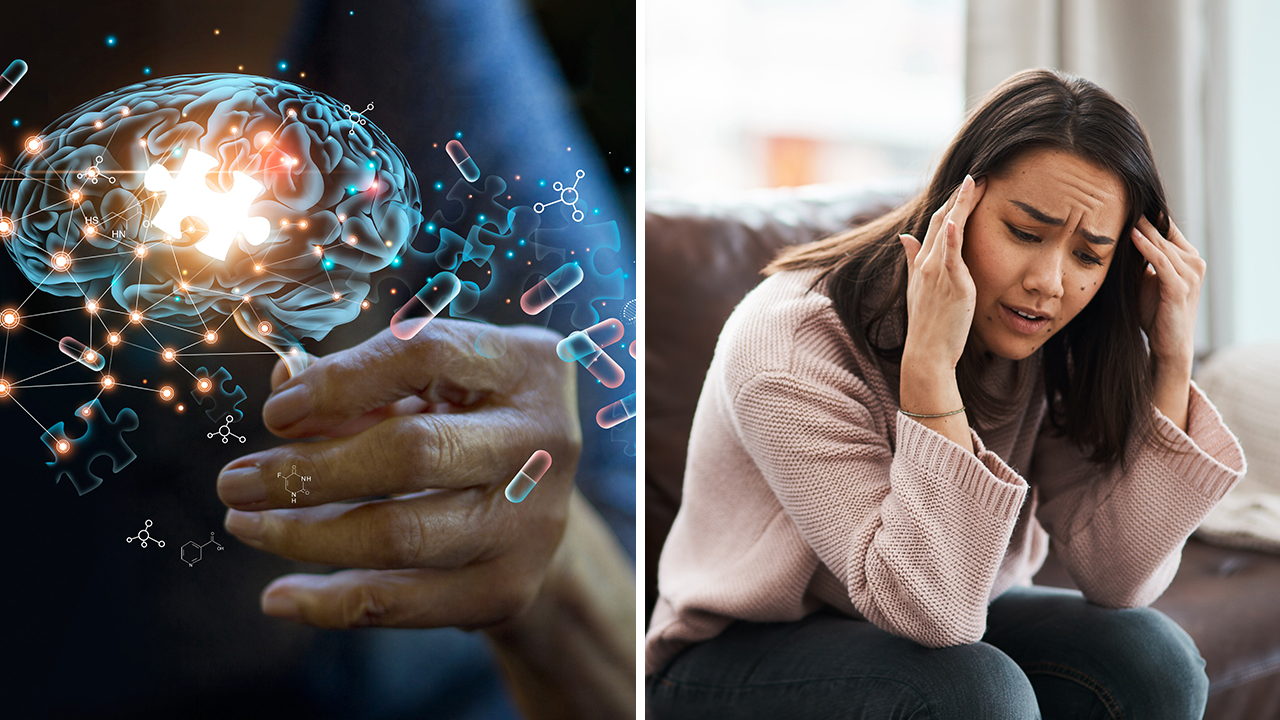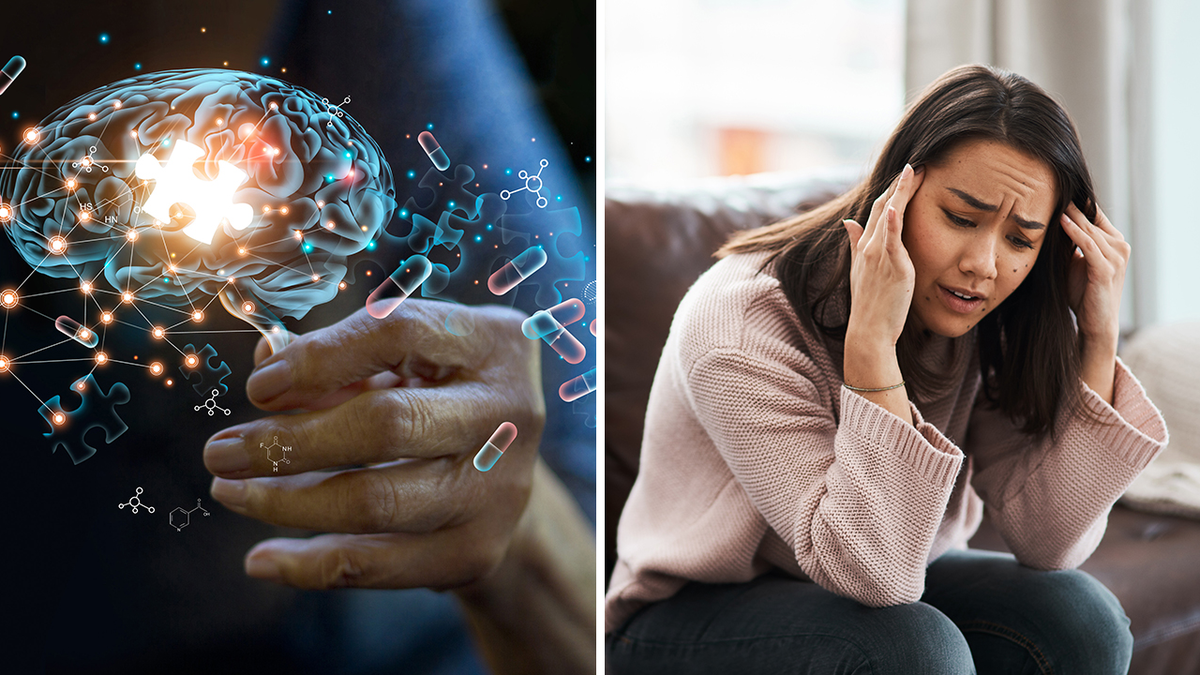Health
5 myths about schizophrenia, according to a mental health expert: ‘Huge stigma’

About 1% of Americans, or nearly 3.5 million people, are affected by schizophrenia — yet the mental disorder remains highly stigmatized and misunderstood, experts say.
The reason, according to Brooke Kempf, a psychiatric mental health nurse practitioner based in Indiana, is a general lack of knowledge about schizophrenia.
“People may see somebody hallucinating and think, ‘That is schizophrenia,’ when there’s so much more to the illness,” she told Fox News Digital in an interview.
STUDY LINKS CANNABIS ABUSE TO SCHIZOPHRENIA IN YOUNG MEN
“It’s important for people to recognize that schizophrenia is a diagnosed and treatable medical condition.”
For World Schizophrenia Day, Kempf shared some of the most common myths and misconceptions surrounding the disorder.
Approximately 1% of Americans, or nearly 3.5 million people, are affected by schizophrenia — yet the mental disorder remains highly stigmatized and misunderstood, experts say. (iStock)
Here’s a look at five.
Myth No. 1: People with schizophrenia are violent
One of the greatest and “most harmful” myths is the notion that people living with schizophrenia are “scary” or “violent,” Kempf said.
“There is a long history of conflating TV or movie characters who are behaving in odd, confusing or frightening ways with a diagnosis of schizophrenia,” she said.
NY WOMAN REVEALS LIFE WITH A SISTER’S SCHIZOPHRENIA, WRITES ‘LOVE LETTER’ TO HER
“However, we have to remember that these are made-up, dramatized situations. A diagnosis of schizophrenia doesn’t have anything to do with what we see on the screen.”
When patients with schizophrenia experience an acute episode — perhaps having delusions or hearing voices — they might behave differently than they typically would, sometimes seeming angry or violent.
“The person is likely experiencing something within themselves that they might be arguing about or responding to, but they aren’t targeting anything toward another person,” Kempf said.

When a patient with schizophrenia is experiencing an acute episode — perhaps having delusions or hearing voices — they might behave differently than they typically would, sometimes seeming angry or violent. (iStock)
When symptoms are managed with medication, “you would probably have no idea of their diagnosis,” she noted.
“Through my long history of working in community mental health and hearing their stories, I know that people living with schizophrenia are good, caring, loving people,” Kempf said.
“They are more likely,” she added, “to be the victim of a violent crime than the perpetrator of one.”
Myth No. 2: People with schizophrenia have multiple personalities
There is a misconception that people with schizophrenia have multiple personalities, which could be because the Greek word “schizophrenia” means “split mind,” Kempf noted.
“However, people with schizophrenia do not have split personalities,” she said.
MORE THAN HALF OF THOSE WITH MENTAL ILLNESS DON’T GET NEEDED CARE
“They might have different behavioral characteristics when they’re ill and experiencing an episode, but it’s not because they have a split personality.”
Myth No. 3: People with schizophrenia are not intelligent
This assumption is completely false, according to Kempf.
“If the illness isn’t well managed and continues to progress, or they have repeated relapses, patients will lose gray matter in their brains, and their cognitive function may decline,” she told Fox News Digital.
“But that does not mean they’re not intelligent.”

One expert said she’s worked with a multitude of “very successful individuals who also happen to live with schizophrenia.” (iStock)
Some patients may experience cognitive decline in the early stages of the disease — referred to as the “prodromal phase,” Kempf said — but early diagnosis and intervention can help prevent that.
Kempf said she has worked with a multitude of “very successful individuals who also happen to live with schizophrenia.”
“People with schizophrenia do not have split personalities.”
In many cases, she noted, people can no longer see the “highly intelligent individual” behind the disease.
“As long as individuals with schizophrenia get the proper treatment — ideally with a long-acting injectable (LAI) medication — they can keep their symptoms controlled and function very well,” Kempf said.
Myth No. 4: Symptoms of schizophrenia only involve hallucinations and delusions
Schizophrenia consists of what is clinically termed “positive” and “negative” symptoms, Kempf noted.
“Delusions and hallucinations, as well as changes in behavior and thoughts, are considered positive symptoms,” she said.

“Delusions and hallucinations, as well as changes in behavior and thoughts, are considered positive symptoms” of schizophrenia, the expert said. (iStock)
Patients experiencing these symptoms may hear voices or have extra thoughts, delusions or fixed false beliefs, the expert explained.
“Hallucinations are not just hearing voices,” Kempf said. “They can occur in multiple ways based on our senses — seeing, hearing, smelling or feeling things.”
Negative symptoms are when people lose interest in the world around them, withdraw or don’t take an interest in everyday social interactions, according to Kempf.
DISRUPTED SLEEP, PLUS NIGHTMARES COULD BE LINKED TO AUTOIMMUNE DISEASES, EXPERTS SAY
“Patients with schizophrenia may get labeled as ‘lazy,’ or they don’t seem as put together,” she said. “But it’s not about laziness. The person’s brain doesn’t connect these things as being important.”
People with schizophrenia may also experience what are referred to as “psychomotor” symptoms, Kempf said — they might seem abnormally slow, and their speech and thought processes can be somewhat delayed or disorganized.
“Unfortunately, if these negative symptoms continue and there isn’t treatment, they can impact cognitive functioning.”
Myth No. 5: People with schizophrenia require long-term or lifelong hospitalization
Hospitalization for a person experiencing acute schizophrenia symptoms is usually very short, according to Kempf.
“For someone having an episode of schizophrenia, the average length of stay may be about five days.”
“In an inpatient setting, for someone having an episode of schizophrenia, the average length of stay may be about five days,” she said.
“If a patient doesn’t respond to medication and can’t function safely on their own, they might have to go to a longer-term, higher-level setting.”
CHICAGO NURSE IS FINALLY FREE OF COVID-19-RELATED PTSD AND DEPRESSION AFTER ELECTRICAL BRAIN TAPPING THERAPY
Today, health care providers aim to give people with schizophrenia community-based services so that they’re able to function on their own, Kempf noted.
This might mean supporting them with employment services and housing opportunities to ensure that they have an affordable and safe place to live.
“Some patients continue to live with their family members; some might live in a group home,” Kempf said.
“People living with this disease deserve to be treated like human beings and with the same care we would provide someone diagnosed with a physical illness.”
From a medical perspective, schizophrenia has different levels of severity, the expert noted.
“But, again, if managed well, with early intervention, an individual can remain high-functioning and live independently,” she said.
CLICK HERE TO SIGN UP FOR OUR HEALTH NEWSLETTER
“Our goal is the least structured environment possible, enabling the person to live a normal life where they can work, grocery shop and drive on a day-to-day basis.”
Ultimately, Kempf said, schizophrenia should be viewed as a disease, not a choice.

“While schizophrenia is a mental health diagnosis, it should be thought of no differently than a physical health diagnosis of diabetes, heart disease or kidney disease,” an expert said. (iStock)
“While schizophrenia is a mental health diagnosis, it should be thought of no differently than a physical health diagnosis of diabetes, heart disease or kidney disease,” she said.
“It just impacts a different organ: the brain.”
Other brain disorders, such as epilepsy, tend to be more accepted by society, she said — but there is still a “huge stigma” surrounding diseases like schizophrenia, “probably because of the fear of the unknown.”
“It is treatable, and both medication and support services are available,” she told Fox News Digital.
“We all have a role to play in helping to dispel myths, foster understanding and reduce stigma,” she continued.
“People living with this disease deserve to be treated like human beings and with the same care we would provide someone diagnosed with a physical illness.”
For more Health articles, visit www.foxnews.com/health.

Health
What Happens If You Eat Eggs Every Day? Nutritionists Share the Benefits

Sign Up
Create a free account to access exclusive content, play games, solve puzzles, test your pop-culture knowledge and receive special offers.
Already have an account? Login
Forgot your password?
Get back to the Sign In
Use left and right arrow keys to navigate between menu items.
Use escape to exit the menu.
Health
Ask a doctor: ‘I swallowed a bug — now what should I do?'

Most people have experienced that moment of discomfort when they realize a bug has wound up where it shouldn’t be — in their windpipe.
That includes Taylor Swift, who on more than one occasion has accidentally swallowed a bug while performing on stage in front of thousands of people.
It can be a startling and somewhat disgusting occurrence — but is this dangerous, or just a nuisance?
LOCAL DENGUE FEVER CASES CONFIRMED IN FLORIDA KEYS, SPREAD BY MOSQUITO BITES
Dr. Raj Dasgupta, a quadruple board-certified physician in California, shared with Fox News Digital the true impacts of accidentally swallowing a bug, and the best thing to do if it happens.
“Swallowing a bug can often happen accidentally when you’re eating or drinking outside, or if a bug flies into your mouth,” Dasgupta, who serves as chief medical advisor for Fortune Recommends, told Fox News Digital via email.
Dr. Raj Dasgupta, a quadruple board-certified physician in California, discussed the impact of accidentally swallowing a bug — and the best thing to do if it happens. (Sleepoplis)
“It can also happen if you’re talking or laughing outdoors. Sometimes it might even happen indoors if bugs are in your food or drink and you don’t realize it.”
ASK A DOCTOR: ‘HOW CAN I PREVENT SCARRING FROM BUG BITES AND POISON IVY?’
Swallowing a bug is usually not dangerous, Dasgupta noted.
“The stomach’s digestive acids usually break down the bug, and it is passed out of the body without causing harm,” he said.

“Swallowing a bug can happen accidentally when you’re eating or drinking outside, or if a bug flies into your mouth,” the doctor told Fox News Digital. (iStock)
If the bug carries harmful bacteria or parasites, however, it could cause gastrointestinal issues or allergic reactions, according to the doctor.
The type of bug can make a difference, he said.
“Bugs like beetles or ants are less of a concern, but bugs that are known to spread diseases — such as mosquitoes — might be riskier.”
If you happen to swallow a bug, drinking some water can help wash it down, Dasgupta said.

Taylor Swift has announced the accidental swallowing of bugs, mid-concert, on more than one occasion. (Marcelo Endelli/TAS23/Getty Images for TAS Rights Management)
“If you start feeling sick, like abdominal pain, vomiting or nausea, keep an eye on your symptoms,” the doctor said.
If you have severe stomach pain, ongoing vomiting, trouble breathing, or swelling, rash or itching, Dasgupta said to see a doctor.
CLICK HERE TO SIGN UP FOR OUR HEALTH NEWSLETTER
“If you know the bug could have diseases or if you have health conditions that might complicate things, it’s a good idea to get checked out to be safe,” he added.
For more Health articles, visit www.foxnews/health
Some bugs — including grasshoppers, beetles, termites, mealworms and even stink bugs — are actually considered edible in certain countries, and are prepared and eaten as part of meals, according to WebMD’s website.
Health
“I’m a Dietitian, and Here’s Why an Overly Restrictive Diet Can Backfire”

Sign Up
Create a free account to access exclusive content, play games, solve puzzles, test your pop-culture knowledge and receive special offers.
Already have an account? Login
Forgot your password?
Get back to the Sign In
Use left and right arrow keys to navigate between menu items.
Use escape to exit the menu.
-

 World1 week ago
World1 week agoOne dead after car crashes into restaurant in Paris
-

 Midwest1 week ago
Midwest1 week agoMichigan rep posts video response to Stephen Colbert's joke about his RNC speech: 'Touché'
-

 News1 week ago
News1 week agoVideo: Young Republicans on Why Their Party Isn’t Reaching Gen Z (And What They Can Do About It)
-

 Movie Reviews1 week ago
Movie Reviews1 week agoMovie Review: A new generation drives into the storm in rousing ‘Twisters’
-

 News1 week ago
News1 week agoIn Milwaukee, Black Voters Struggle to Find a Home With Either Party
-

 Politics1 week ago
Politics1 week agoFox News Politics: The Call is Coming from Inside the House
-

 News1 week ago
News1 week agoVideo: J.D. Vance Accepts Vice-Presidential Nomination
-

 World1 week ago
World1 week agoTrump to take RNC stage for first speech since assassination attempt















